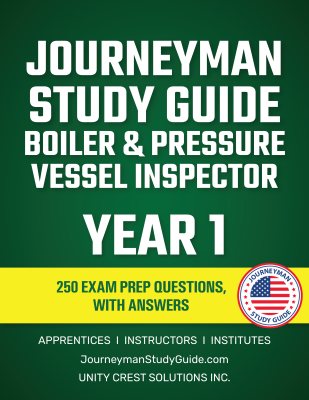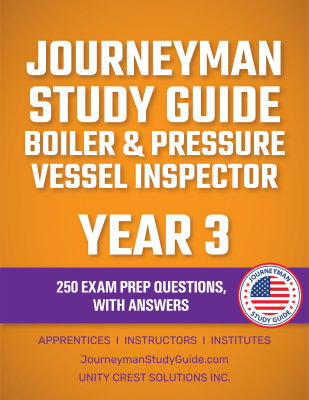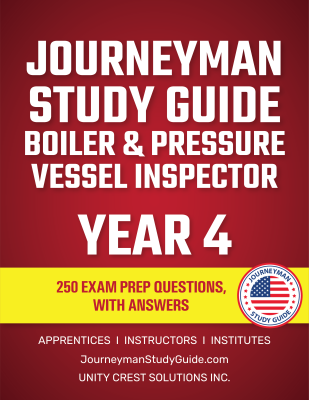Questions, Answers, & Explanations
Get clear explanations behind every answer, perfect for deeper learning and more thorough exam preparation.
Site Updates in Progress: Things might look different as we work on enhancing your experience.
What is a Boiler and Pressure Vessel Inspector?
Boiler and Pressure Vessel Inspectors are specialized professionals responsible for ensuring the safety, reliability, and compliance of boilers, pressure vessels, and related equipment across various industries in America. They conduct detailed inspections, enforce industry regulations, and verify equipment integrity to prevent accidents and ensure operational efficiency.
Key Responsibilities:
Inspectors undertake critical duties requiring extensive technical knowledge and strict adherence to safety standards:
Skills and Traits for Success:
Successful Boiler and Pressure Vessel Inspectors typically possess:
Industries Where Inspectors Thrive:
Inspectors play a critical role across multiple American industries:
Why Choose This Career?
A career as a Boiler and Pressure Vessel Inspector offers significant advantages:
Ready to Start Your Career as a Boiler and Pressure Vessel Inspector?
Equip yourself with our specialized study materials, including targeted Question & Answer (Q&A) resources, in-depth Question, Answer, & Explanation (Q/A Explanation) materials, and realistic interactive Online Tests, specifically tailored for aspiring inspectors.
What to Expect on the Boiler and Pressure Vessel Inspector Certification Exam
The Boiler and Pressure Vessel Inspector Certification Exam ensures professionals meet rigorous safety and compliance standards set forth by regulatory bodies like the American Society of Mechanical Engineers (ASME) and OSHA. Employers across diverse sectors, such as energy corporations including Duke Energy and Southern Company, manufacturing giants like Caterpillar and General Electric, and public institutions, highly value certification for validating professional expertise and ensuring workplace safety.
Exam Format:
The certification exam typically includes:
Key Topics Covered:
The exam thoroughly evaluates essential skills and knowledge:
Passing Requirements:
Candidates typically must achieve a minimum score of 70% to pass the certification exam. Practical assessments, if required, may include demonstrating effective inspection techniques and regulatory knowledge.
Tips for Effective Preparation:
Ready to Succeed on Your Certification Exam?
Prepare thoroughly with our expertly crafted resources specifically designed for aspiring Boiler and Pressure Vessel Inspectors.
What Types of Questions Are on the Boiler and Pressure Vessel Inspector Certification Exam?
The certification exam evaluates your proficiency in boiler and pressure vessel safety, compliance standards, inspection methods, and practical knowledge essential for industry professionals. Certification demonstrates your capability to uphold rigorous safety standards, valued by American employers including major corporations such as Honeywell, General Electric, and leading energy providers like Exelon Corporation.
Common Question Formats:
The exam includes diverse question types to comprehensively assess knowledge and practical skills:
Sample Questions:
Tips for Exam Success:
Ready to Excel?
Ensure your success with our targeted practice resources tailored specifically for aspiring Boiler and Pressure Vessel Inspectors.
What Is It Like to Work as a Boiler and Pressure Vessel Inspector?
Working as a Boiler and Pressure Vessel Inspector involves dynamic, detail-oriented responsibilities critical to safety and compliance in America's industrial, manufacturing, and public sectors. Inspectors collaborate closely with companies such as Duke Energy, Southern Company, and major manufacturers including Caterpillar and General Electric.
Morning: Inspection Preparation and Safety Reviews
The workday typically begins early with preparation and organization:
Midday: Conducting Inspections and Assessments
Inspectors spend significant portions of the day performing detailed inspections:
Afternoon: Documentation and Recommendations
Afternoons are dedicated to documentation, reporting, and follow-up activities:
Challenges and Rewards:
Ready to Launch Your Career?
Equip yourself for success with our tailored study materials, including focused Q&A, comprehensive Q/A Explanation, and interactive Online Tests, specially designed for aspiring Boiler and Pressure Vessel Inspectors.
What Are the Long-Term Benefits of a Career as a Boiler and Pressure Vessel Inspector?
A career as a Boiler and Pressure Vessel Inspector provides long-term stability, competitive compensation, and multiple pathways for professional growth. Inspectors can advance within diverse sectors, including energy, manufacturing, and public institutions, with opportunities at top American employers such as Duke Energy, Caterpillar, General Electric, and government facilities nationwide.
Earning Potential:
Compensation typically depends on experience, certifications, location, and industry:
Regional Salary Differences:
Career Growth Opportunities:
The Benefits of Certification:
Why Choose This Career?
Ready to Advance Your Career?
Prepare for certification and long-term success with our comprehensive study materials, detailed Q&A, in-depth Q/A Explanation, and realistic Online Tests.
How Much Can You Earn as a Boiler and Pressure Vessel Inspector?
Boiler and Pressure Vessel Inspectors enjoy competitive wages that reflect their specialized skills, critical responsibilities, and high industry demand. Salaries vary based on experience, certifications, geographic region, and specific industries, with significant opportunities provided by prominent American companies like Exelon Corporation, Honeywell, and Caterpillar.
General Wage Ranges:
Factors That Impact Earnings:
Want to Maximize Your Earning Potential?
Accelerate your career and salary growth with our targeted Q&A, detailed Q/A Explanation, and interactive Online Tests, specifically designed for Boiler and Pressure Vessel Inspectors.
What Tools and Resources Do Boiler and Pressure Vessel Inspectors Need to Succeed?
Inspectors rely heavily on specialized tools, advanced equipment, and comprehensive resources to conduct thorough and compliant inspections. Quality equipment and continuing education ensure adherence to industry standards set by the American Society of Mechanical Engineers (ASME) and Occupational Safety and Health Administration (OSHA).
Essential Tools for Inspectors:
Recommended Learning Resources:
Why the Right Tools and Resources Matter:
Investing in high-quality tools and continuous learning significantly enhances safety, accuracy, and career progression. Adequate resources and professional education are essential for long-term success and operational excellence.
Ready to Succeed?
Maximize your inspection capabilities with our specialized study resources, comprehensive Q&A, in-depth Q/A Explanation, and realistic Online Tests tailored specifically for Boiler and Pressure Vessel Inspectors.
Where Can You Learn Boiler and Pressure Vessel Inspection Skills?
Boiler and Pressure Vessel Inspectors gain expertise through structured educational programs combining practical training with comprehensive classroom instruction. Across America, numerous specialized institutions and training centers offer robust programs aligned with industry standards from ASME and OSHA, supported by employers such as General Electric, Honeywell, and Exelon Corporation.
Types of Boiler and Pressure Vessel Inspector Education Programs:
What to Expect in an Inspection Training Program:
How to Choose the Right Program:
Why Education Matters:
Proper training and certification significantly enhance employability, earning potential, and professional advancement opportunities.
Ready to Begin Your Career?
Start your professional journey with our specialized study resources, comprehensive Q&A, detailed Q/A Explanation, and realistic Online Tests, tailored specifically for Boiler and Pressure Vessel Inspectors.
Why Join a Union or Connect with Employers?
Joining unions and aligning with reputable employers provides Boiler and Pressure Vessel Inspectors significant benefits, including competitive wages, career stability, continuous training, and improved working conditions. Prominent unions like the International Brotherhood of Boilermakers (IBB) and major American employers such as General Electric, Honeywell, and Exelon Corporation offer substantial opportunities.
Benefits of Joining a Union:
Top Unions for Inspectors:
Connecting with Employers:
Tips for Finding Work:
Why Unions and Employers Matter:
Leveraging connections with unions and reputable employers significantly enhances your career prospects, earning potential, and professional stability.
Ready to Connect?
Accelerate your career with our targeted study materials, comprehensive Q&A, detailed Q/A Explanation, and interactive Online Tests, specifically designed for aspiring Boiler and Pressure Vessel Inspectors.
How to Stay Ahead in the Boiler and Pressure Vessel Inspection Industry
The Boiler and Pressure Vessel Inspection industry continuously evolves, driven by advancements in inspection technologies, safety regulations, and environmental standards. Staying competitive as an inspector requires ongoing education, adapting to new technologies, and staying informed about regulatory changes from organizations like the American Society of Mechanical Engineers (ASME) and Occupational Safety and Health Administration (OSHA).
Emerging Trends in Inspection:
Best Practices for Professional Growth:
Challenges and Opportunities:
Sustainability in Practice:
Why Staying Ahead Matters:
Continuous professional development and proactive industry engagement lead to career advancement, increased earnings, and long-term success in inspection roles.
Stay Competitive and Informed:
Maximize your career potential with our specialized study materials, comprehensive Q&A, in-depth Q/A Explanation, and realistic Online Tests specifically tailored for Boiler and Pressure Vessel Inspectors.
Get clear explanations behind every answer, perfect for deeper learning and more thorough exam preparation.
Quick and easy practice to test your knowledge anytime, anywhere—ideal for simple, on-the-go preparation.










